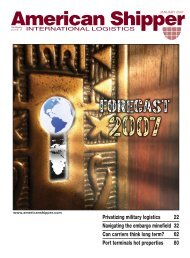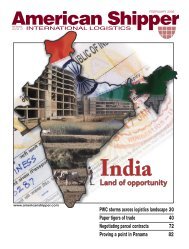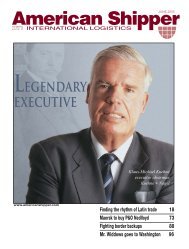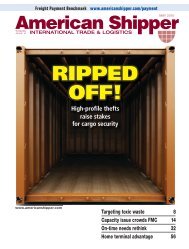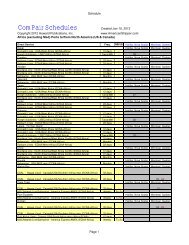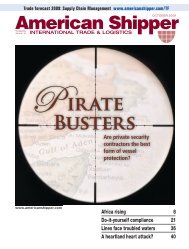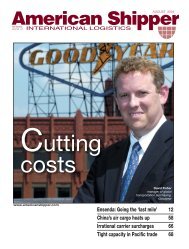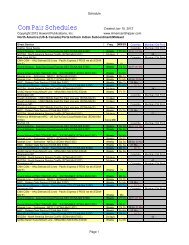TRANSPORT / PORTSmany members to conclude that the administrationwas simply showing disdain againfor congressional oversight.In the aftermath of the DP World controversy,administration officials admitted thatthey need to do a better job of informingCongress about cases under review. Legaland security experts said the administrationprobably could have defused the whole situationby briefing leaders of congressionalintelligence committees ahead of time aboutDP World’s limited role within the ports andDubai’s track record supporting U.S. interestssince 9/11.Instead, opponents quickly characterizedthe sale as a takeover of six major U.S. portsby an Arab company with ties to terrorists.Administration efforts to explain that DPWorld was only leasing specific terminalswithin the ports and that the Coast Guardand U.S. Customs were still responsiblefor overseeing security measures related tocargo and ports proved too little too late.Although officials stood behind the technicalitiesof the confidentiality process, itbecame clear during hearings on the subjectthat there isn’t an absolute prohibition ondiscussing foreign security clearances withmembers of Congress.Critics contend that the dearth of investigationsproves that the CFIUS process isbroken because the Treasury Departmentis more interested in promoting its openinvestment policies than blocking dealsfor security reasons. The Government AccountabilityOffice in Congress issued areport last September stating that CFIUSnarrowly defines what constitutes a threatto national security.Congress should share the blame for notchanging the CFIUS process to meet thepost 9/11 security environment, said CharliePapavizas, a partner at Winston & Strawn,whose clients include ocean carriers seekingto meet U.S. citizenship requirements fortheir North <strong>American</strong> businesses.Last year, the Chinese National OverseasOil Co. (CNOOC) pulled out of a bid forU.S. multinational oil company Unocal afterCongress raised alarms about the potentialthreat to national security. Congress seemedintent on reforming the CFIUS process atthat time, but never made any correctionsafter the CNOOC deal evaporated.The hearings resulted in some informalpromises by the administration, which Treasuryofficials said they followed by givingthe port sale more than 30 days of scrutiny,getting other agencies and the intelligencecommunity involved early on, and agreeingto brief Congress on a quarterly basis aboutCFIUS reviews in the pipeline.The administration had actually plannedto begin briefing lawmakers about DP84 AMERICAN SHIPPER: APRIL 2006World and other cases the week that newsof the sale broke, but by then members ofCongress had already begun a campaign tosink the deal.“The real problem is that CFIUS is a ColdWar relic,” Papavizas said in an interview. “Itwas set up to prevent the Soviet Union andsatellite countries from getting our technologyso the Army doesn’t wake up one dayand find out that the Chinese governmentowns the subcontractor that provides therangefinder for the M1A1 tank.”When it comes to security concerns,CFIUS primarily focuses on telecommunications,laser technology, micro-technologyand other military useful and leading-edgetechnologies, rather than on terrorism or thevulnerability of the supply chain, he said.“The real problemis that CFIUSis a Cold War relic.”Charlie Papavizaspartner,Winston & StrawnLawmakers criticized the mid-level officialson CFIUS for not bumping up theDP World decision to their superiors, whomight have had the political sense to consultCongress. Stewart Baker, assistant secretaryfor policy and international affairs, tookresponsibility for signing off on the CFIUSapproval on behalf of DHS, and said he didnot refer the case to Deputy Secretary MichaelJackson because the agencies withinthe department supported the deal.“You can’t really blame the committeebecause it was not set up to do somethingthat deals with 9/11,” Papavizas said.Foreign investment regulators are accustomedto approving mergers except in clearcases of security threats because U.S. policyis geared to promote foreign investmentand aren’t used to drawing a line betweenan open economy, and protecting the nationfrom amorphous terrorist threats.“It’s unfair to expect bureaucrats to strikethat balance. That’s a national policy question,”Papavizas said.“If you were on the committee and noadjustments had been made by Congresssince 9/11, and you had been given no newreporting requirements, had not been told toput terrorist threats in a new category, whatwould you take from this? You’d take fromthis that it’s business as usual” and the DPWorld sale is no different than prior investmentsthat have been approved.Besides the lack of emphasis on terrorism,CFIUS process also does not factor insupply chain and transportation systems intothe security equation, Papavizas said.Unlike ocean carriers and airlines, andshipyards in times of war, there are not citizenshiprequirements for terminals, althoughthat could change if Hunter gets his way.CFIUS has broadened the scope ofnational security reviews and included theprotection of critical infrastructure as a factorsince 9/11, countered David Marchick,a partner at Covington & Burling whospecializes in guiding companies throughthe CFIUS process.Several proposals are in the pipeline thatwould replace Treasury as the department incharge of coordinating foreign investmentexams, make the CFIUS process moretransparent and include a role for Congressto review deals and possibly void them.Rep. Don Manzullo, R-Ill., introduced abill that would require automatic, extendedinvestigations by CFIUS when foreign governmentsare purchasers, and open up theprocess to greater participation by Congressand the public. CFIUS would be required toprovide a notice and comment period in theFederal Register, hold a public hearing andinform the relevant congressional committeeswhen an application is filed. Manzullo alsoproposed that the CFIUS process be chairedby the Commerce Department’s Bureau ofIndustry and Security, which examines theimpact of foreign imports on the defenseindustrial base and monitors licensing of exportswith dual military/commercial uses.Collins proposed establishing a new taskforce — the Committee for Secure Commerce— to replace CFIUS, and substitutingthe Department of Homeland Security forTreasury as the lead agency in charge ofthe process. The secretaries of Defense andTreasury would serve as vice chairs and theDirector of National Intelligence would bea standing member. The bill specifically includeshomeland security among the factorsthe committee should consider in decidingwhether to review or investigate a transactionand a requirement to brief Congress.But Congress should be careful not to overreactby enacting changes that could discourageforeign investment and encourage othergovernments to erect new obstacles to U.S.investment abroad, several industry officialstestified before the House Financial Servicessubcommittee on domestic and internationalmonetary policy, trade and technology.The United States spends more than itproduces and saves, and with a projectedcurrent account deficit of $900 billion thisyear, is more dependent than ever on importingdollars. Foreign investment is how theU.S. economy recycles money it loses dueto a burgeoning trade deficit, which rose to
TRANSPORT / PORTSa record $68.5 billion in January.The UAE is one of the few countrieswith which the United States actually hasa trade surplus.Increased consultations and public disclosureare a problem because of the potential forleaks that could make investors wary aboutgoing through the CFIUS process, accordingto Treasury and industry officials.Giving Congress a direct role in the decision-makingprocess would be an even biggermistake, said William Reinsch, president ofthe National Foreign Trade Council and formerundersecretary of the Export Administrationin the Clinton administration responsiblefor the dual-use export control program.The Exon-Florio provision was writtenduring a period of paranoia about Japaneseacquisitions, “but its drafters neverthelessunderstood very well that it made no sensefor Congress to review and opine on specificinvestments.“That would be micro-management in theextreme that would guarantee the injection ofpolitical criteria into a process that should bebased strictly on national security,” he said.Port security becomes priorityOnslaught of bills attempt to address vulnerabilities.More than four years afterthe Sept. 11, 2001 attacks,the U.S. governmentis still trying to implementa comprehensive maritime securitystrategy for port facilities, vessels,crews and cargo to prevent a largescaleattack on a port or major citythat could shut down commerce foran extended period.Cargo entering the United Statesis subject to 24-hour notificationprior to lading at a foreign port, overseasinspection at any of the 43 portsparticipating in the Container Security Initiative,and extra private sector controls whenbeing shipped by companies participatingin the Customs-Trade Partnership AgainstTerrorism, as well as port and vessel securityclearances from the Coast Guard.Lawmakers used the vulnerability of theports against the president, claiming thatsecurity was too poor to introduce anotherelement of uncertainty in the form of astate-owned company from Dubai.“If port security is not a top priority forour own government, how can we everexpect it to be a priority for a foreigngovernment,” said Sen. Edward Kennedy,D-Mass., during a Feb. 23 Armed ServicesCommittee hearing.The Dubai Ports World controversy gavelife to many new or existing pieces of legislationaddressing various aspects of portand cargo security, and sent shivers throughsome industry groups that recent efforts tostreamline cargo clearance at the nation’sborders would be trampled under a floodof heavy-handed regulations.Department of Homeland Security officialssaid they negotiated commitmentsfrom DP World that Dubai would continue toparticipate in the Container Security Initiativeand the Megaports Initiative, and that P&O’smembership in the voluntary Customs-TradePartnership Against Terrorism program thatencourages the use of security best practices,would transfer to DP World.Under CSI, U.S. Customs andBorder Protection officers arestationed in overseas ports totarget suspicious containersfor inspection by the hostcountry. Dubai Customsis also in the process of installingfour container-sizeradiation detection machinesloaned by the Department ofEnergy under the Megaports program.C-TPAT is a program that provides reducedinspection levels for shippers who tighteninternal shipping controls and demand similarsecurity measures by their manufacturing andtransportation providers.But those assurances did not providemuch comfort to lawmakers who insistedthe programs are largely ineffective becausefew containers are actually inspected overseas,and the supply chain security programfunctions as an honor system that largelybased on paper-based reviews.Critics of the Bush administration’sprogress on port security say that while theCoast Guard and CBP are well intentioned,they have not been given the resources toeffectively carry out security programs putin place after the 9/11 attacks.The Coast Guard, for example, has only 20inspectors, 13 for all of Europe, Africa, LatinAmerica and Central America and seven forAsia. This means foreign ports do not getfrequent checks to make sure they meet internationalmaritime security requirements,according to Stephen Flynn, an authority onborder security and a senior fellow at theCouncil on Foreign Relations.“There are more TSA security agentsat one security checkpoint (at LaGuardiaAirport) than the Coast Guard has receivedfor the entire inspection system. This is nota credible system,” he said at a recent Househearing.Several pieces of port security legislationthat languished in Congress nowhave considerable momentum, and manycommittees are expected to start passingbills in this area by April. Many measuresfocused on expanding port security grantsand requiring significantly higher levels ofcargo inspections.Republican Reps. Duncan Hunter, thepowerful chairman of the House ArmedServices Committee, and Jim Saxton, R-N.J., co-authored an anti-DP World billthat includes a provision to scan all cargocontainers and trucks entering the UnitedStates for terrorist weapons.Hunter said on C-SPAN’s WashingtonJournal program that the United States hasthe technology to do an X-ray exam of everyocean container or truckload exiting a U.S.sea or land port.“We need to have a directive to portdirectors that they need to figure out aconfiguration for their port to be able to doa screening of these cargo containers as theycome off the ships or come off the trucks.Either do that at the port — if they haven’tdone that earlier at the country of origin— or let’s find somebody who can,” he saidin a direct shot at CBP, which is responsiblefor inspecting cargo imports.CBP currently uses automated X-rayor gamma ray imaging systems to inspectabout 5 percent of all containers enteringthe country. Some of the inspections aredone by foreign customs as part of CSI.The DHS uses a risk-based managementapproach that relies on advance shippingdocuments and intelligence to target shipmentsthat score high on a computer analysisfor non-intrusive imaging or, if necessary,physical inspections.“We could easily have one of these hightechwand systems that will allow trucks tocome through at a couple of miles an hour.So while they are doing their paperwork,we could have them X-rayed. We could dothat. That’s something that a port directorwho is aggressive and creative could do,”Hunter said.“He could figure out how to get thosemachines in there, how to configure themso you could pull those trucks through. Youwouldn’t stop commerce in the least, andthat’s the one time when everybody is linedup on the same road and they are all in arow and you can bring them through likecattle coming through a chute and inspectthem,” he said.At a hearing March 2, Hunter said importersshould pay a fee to cover the cost ofAMERICAN SHIPPER: APRIL 2006 85



